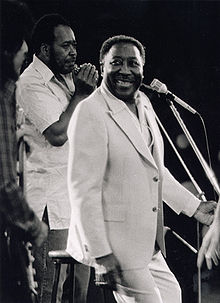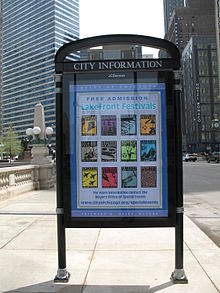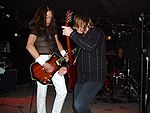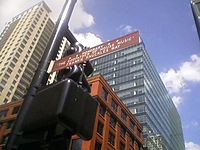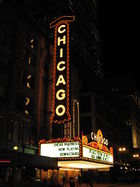- Music of Chicago
-
As the largest non-coastal United States city, Chicago, Illinois is a major center for music[1] in the midwestern United States, especially in the early 1900s, when the "Great Migration" of poor black workers from the South into the industrial cities brought traditional jazz and blues music to Chicago, resulting in the urban variants Chicago blues and "Chicago-style" Dixieland jazz. Notable blues artists included Muddy Waters, Junior Wells, Howlin' Wolf and both Sonny Boy Williamsons; jazz greats included Nat King Cole, Gene Ammons, Benny Goodman and Bud Freeman. Chicago is also well known for its soul music. Chicago has also been home to a thriving folk music scene, particularly in the 1960s and 1970s. John Prine, Steve Goodman and Bonnie Koloc were the most prominent folk singer-songwriters of that time. The city is also the birthplace of the House music of music, whose history is related to the development and fostering of the Techno style of music in Detroit, Michigan. Over the 1980s and 1990s the Chicago rock music scene became very popular, especially the heavy rock and punk rock scene, as it is still today. The Hip Hop scene in Chicago is also very influential and popular, with major artists including Kanye West, Twista, Common, Lupe Fiasco, Da Brat, Yung Berg and Shawnna. Chicago also has a growing underground metal scene that is taking shape right now, with groundbreaking bands such as Sweet Cobra, Veil Of Maya, Nachtmystium, Plague Bringer, Born Of Osiris, Indian, Lair Of The Minotaur, and Enjoy The Massacre, each making a severe impact in the metal world. And the orchestras of Chicago include the Chicago Symphony Orchestra which is one of the nation's oldest and most respected orchestras.[2], the Lyric Opera of Chicago, and the Chicago Sinfonietta[3].
Contents
Blues
Chicago's music scene has been well known for its blues music for many years. Chicago Blues uses a variety of instruments in a way which heavily influenced early rock and roll music, instruments like electrically amplified guitar, drums, piano, bass guitar and sometimes saxophone or harmonica which is generally used in Delta blues, which originated in Mississippi. Chicago Blues has a more extended palette of notes than the standard six-note blues scale; often, notes from the major scale and dominant 9th chords are added, which gives the music a more "jazz feel" whilst still being in the confines of the blues genre. Chicago blues is also known for its heavy rolling bass. The music developed mainly as a result of the "Great Migration" of poor black workers from the South into the industrial cities of the North such as Chicago in particular, in the first half of the 20th century.
Chicago is one of the places where the faster juicier Boogie Woogie emerged from the Blues. The most renowned early recordings of boogies were made in Chicago with Clarence Pinetop Smith who might have been influenced by the brothers Hersal Thomas and George W. Thomas from Houston who were together in Chicago in the 1920s.
Chicago blues and boogie music continues to be popular today with the annual Chicago Blues Festival, and with appreciation of the many musicians such as Muddy Waters, Howlin' Wolf, and Willie Dixon; guitar players such as Tampa Red, Buddy Guy, Bo Diddley and Elmore James; and "harp" (blues slang for harmonica) players such as Big Walter Horton, Little Walter, Sonny Boy Williamson I, Syl Johnson, Charlie Musselwhite, Junior Wells, and, most notably, James Cotton.
Jazz
The Chicago style
The distinctive Chicago style of jazz originated in southern musicians moving North after 1917, bringing with them the New Orleans "Dixieland" or sometimes called hot jazz styles.[4] First King Oliver and Jelly Roll Morton became stars of the Chicago jazz scene. Finally Louis Armstrong's recordings with his Chicago-based Louis Armstrong and his Hot Five and Hot Seven band came out in the years 1925 to 1928. These recordings marked the transition of original New Orleans Jazz to a more sophisticated type of American improvised music with more emphasis on solo choruses instead of just little solo breaks. This style of playing was adopted by white musicians who favored meters of 2 instead of 4.[5] Emphasis on solos, faster tempos, string bass and guitar (replacing the traditional tuba and banjo) also distinguish Chicago-style playing from Dixieland.
Important musicians in the Chicago style include Lovie Austin, Muggsy Spanier, Jimmy McPartland, Bix Beiderbecke, Eddie Condon, Bud Freeman, Benny Goodman, Gene Krupa, Frank Teschemacher, and Frank Trumbauer.[5] The gangsters of Chicago engaged profiled musicians like Earl Hines who's benefit was to lead an orchestra in one of the city's top locations. Earl Hines and Benny Goodman emancipated from Chicago style when they became two of the most famous band leaders of the swing era.
Two decades later original Chicago-style pianist Art Hodes presented the classic jazz style in a TV show series.
Modern Chicago jazz
In the 21st century, Chicago continues to have a vibrant and innovative jazz scene, such as the annual Chicago Jazz Festival[6]. Famous Chicago Jazz Festival performers include Miles Davis, Sonny Rollins, Ornette Coleman, Benny Carter, Ella Fitzgerald, Anthony Braxton, Betty Carter, Lionel Hampton, Chico O'Farrill's big band, Jimmy Dawkins, Von Freeman, Johnny Frigo, Slide Hampton, Roy Haynes, and many others. Major musicians from all living eras of jazz perform regularly in the city, release recordings, and tour nationally and internationally. Sinyan Shen, internationally known for his Shanghai classical repertoire and Shanghai jazz performances based on tonal interests and just intervals, is based in Chicago.
Musicians still performing today who originally came to prominence in the bebop and hard bop eras include Von Freeman and Jimmy Ellis, both contemporaries of former Chicagoan Johnny Griffin.
Members of Chicago's Association for the Advancement of Creative Musicians working regularly in the city include Fred Anderson, Ernest Dawkins, Aaron Getsug, and Isaiah Spencer. Since the 1960s, members of the organization have performed their version of "Great Black Music" throughout the world.
Innovative jazz musicians who have come to public attention since the early 1990s include Marbin, David Boykin, Karl E. H. Seigfried, Jeff Parker, and Jim Baker. Common to many of this new generation is an embrace of a wide variety of styles and techniques.[7]
Soul
During the mid 1960s to the late 1970s a new style of soul music emerged from Chicago. The sound of Chicago soul, like southern soul with its rich influence of black gospel music, also exhibited an unmistakable gospel sound, but was somewhat lighter and more delicate in its approach, or sometimes called soft soul. There have been many popular R&B/soul artists from Chicago such as The Impressions, Curtis Mayfield, Lou Rawls, Jess Powell and the Supaflyz The Chi-lites, The Five Stairsteps, The Staple Singers, Rufus, Chaka Khan, R Kelly, Dave Hollister, Carl Thomas, and Jennifer Hudson. Chicago soul labels, including, Vee-Jay, Chess Records, OKeh, ABC-Paramount, One-derful, Brunswick, and Curtom, established a major presence in R&B/Soul music.
Rock
The rock band Chicago was named after the city, although its original name was the Chicago Transit Authority. The band's name was shortened to Chicago after the CTA threatened to sue them for unauthorized use of the original trademark. Other popular Chicago-based bands from the 1970s and early 1980s include Styx, Survivor, and Cheap Trick (from nearby Rockford).
In the 1980s and 1990s, alternative rock artists Local H, Eleventh Dream Day, Ministry, Veruca Salt, The Barbie Army, My Life With the Thrill Kill Kult, Material Issue, Liz Phair, Urge Overkill, The Squids, LaTour, The Tossers, and The Smashing Pumpkins emerged from Chicago. The 2000s have seen local Chicago artists Disturbed, Alkaline Trio, Kill Hannah, The Academy Is, Rise Against, The Audition, Spitalfield, Chevelle, Seven Day Sonnet, the Plain White T's, and Fall Out Boy also attain success around the U.S., Chicago has become known for indie rockers following in the paths of the Smashing Pumpkins, Urge Overkill, Wilco, and The Jesus Lizard; bands like The Sea and Cake, Califone, OK Go, The Greenskeepers, Andrew Bird and Umphrey's McGee hail from the city. In recent years Chicago has become a pinnacle in the indie rock scene, attracting both premier indie bands and industry attention. Matthew and Eleanor Friedberger of the Fiery Furnaces, who now reside in Brooklyn, New York are originally from Oak Park, Illinois, a suburb of Chicago.
Being home to a number of independent record labels such as Touch and Go Records, Thrill Jockey Records, Drag City Records, and Hozac Records, Chicago has one of the most active indie scenes in American next to New York's. Not only being home to the foundations of American Hardcore punk, Alt-Country, House music, Noise Rock, Industrial music, and many other Independent music scenes, it is also a city for an independent band to establish a cult following due to its variety of both contemporary and legendary music venues. Despite the scene's often distaste for local politics, city funding has allowed Chicago to become America's premier music festival city, hosting several popular indie headliners in the past couple of years such as Superchunk, Black Francis, Pavement (band), The Flaming Lips, Spoon (band), De La Soul, Mos Def, Isis (band), Olivia Tremor Control, Junior Boys, and music festivals such as Pitchfork Music Festival, Lollapalooza (since 2005), Chicago Blues Festival, Alehorn of Power, Riot Fest, and most recently a free weekly Monday music series called "Downtown Sound", at Millennium Park's Jay Pritzker Pavilion, featuring popular independent acts performing in a theater commonly used for Classical music, allowing them to receive brilliantly engineered acoustics as well as an outdoor performance space. Chicago's music scene varies from neighborhood to neighborhood, but overall has a large focus on independent music due to its influences from local record stores and local radio stations WXRT-FM and Loyola University Chicago's WLUW. Chicago is home to music media giant Pitchfork Media, and most recently CHIRP (Chicago Independent Radio Project)[8], a community radio station not only providing the internet with independent tunes, but also an organization bidding for support to convince the United States Congress and the Federal Communications Commission to remove existing barriers to the granting of low power FM radio licenses in urban areas, including Chicago.
A handful of punk rock bands are also based in Chicago. Some of the more famous punk rock products of the city are Naked Raygun, The Effigies, 88 Fingers Louie, Big Black (featuring Steve Albini), and Screeching Weasel. Many of these punk and indie bands got their start at noted alternative music venues Metro (originally Cabaret Metro), and from 1987–2000, Lounge Ax.
Since the late 1990s/early 2000s, Chicago has become a major force in the American Heavy Metal scene, from Nu-Metal to Deathcore to Industrial Metal. Bands such as Dope, From Zero, No One, Ministry, Born of Osiris, Veil of Maya, Rooks, and Oceano hail from the Chicago area.
House
House music originated in a Chicago nightclub called The Warehouse. Chicago house is the earliest style of house music. While the origins of the name "house music" are unclear, the most popular belief is that the term "house music" can be traced to the name of that club. DJ Frankie Knuckles originally popularized house music while working at The Warehouse.[9]
House music was developed in the houses, garages and clubs of Chicago initially for local club-goers in the "underground" club scenes, rather than for widespread commercial release. As a result, the recordings were much more conceptual, longer than the music usually played on commercial radio. House musicians used analog synthesizers and sequencers to create and arrange the electronic elements and samples on their tracks, combining live traditional instruments and percussion and soulful vocals with preprogrammed electronic synthesizers and "beat-boxes".
Important musicians in the Chicago house include Adonis, Mark Farina, Keith Farley, Felix da Housecat, Fingers, Inc., Ron Hardy, Larry Heard, Steve 'Silk' Hurley, Marshall Jefferson, Curtis Jones, Paul Johnson, Frankie Knuckles, Lil' Louis, Jesse Saunders, Joe Smooth and Ten City.
Hip-Hop/Rap
The Hip Hop of Chicago or sometimes called Chi-town[10] in the rap industry, includes rappers like Kanye West, Twista, Common, Lupe Fiasco, Da Brat, Yung Berg, and Shawnna. It started to emerge on the scene in 2004 with Kanye West, who after his first album was nominated for Grammy Award for Album of the Year and won Best Rap Album. And continued with Lupe Fiasco in 2006, with his album Lupe Fiasco's Food & Liquor which was number one for the top selling Rap album. And in 2007, Yung Berg released his hit single "Sexy Lady". As of today, Chicago is still growing in the Hip-Hop and rap industry.
Music venues/institutions in Chicago
Venues
Chicago has many Music venues[11].
- Aragon Ballroom
- Arie Crown Theatre
- Beacon Street Gallery and Performance Company
- B'Ginnings
- Chamber Opera Chicago
- Charter One Pavilion
- Chicago Opera Theater
- Chicago Shakespeare Theater
- Chicago Theatre
- Civic Opera House
- Congress Theater
- The Cubby Bear
- Double Door
- Drury Lane Theatre
- Elastic Arts
- The Empty Bottle
- The Fireside Bowl
- Ford Center for Performing Arts
- Gate of Horn
- Gateway Theatre
- Goodman Theatre
- Jay Pritzker Pavilion
- The Jazz Showcase
- LaSalle Bank Theatre
- Lincoln Hall
- Lounge Ax
- Lyric Opera of Chicago
- Marriott Theatre in Lincolnshire, Illinois
- Metro Chicago
- Park West
- Portage Theater
- Redmoon Theater
- Riviera Theatre
- Sears Centre
- Second City Theater
- Symphony Center (home to the Chicago Symphony Orchestra and Chicago Sinfonietta)
- UIC Pavilion
- United Center
- The Vic Theater
- Woodstock Opera House
Institutions
See also
- Chicago Blues
- Chicago Blues Festival
- Chicago house
- Chicago hardcore
- Chicago Soul
- Chicago Jazz Festival
- Culture of Chicago
- Chicago record labels
- Chicago theatre
- History of Chicago
- List of entertainers who have lived in or near Chicago
- List of songs about Chicago
- Media in Chicago
- Music of Illinois
- Wax Trax!
- Music Dealers, LLC
Music of the United States AK - AL - AR - AS - AZ - CA - CO - CT - DC - DE - FL - GA - GU - HI - IA - ID - IL - IN - KS - KY - LA - MA - MD - ME - MI - MN - MO - MP - MS - MT - NC - ND - NE - NH - NM - NV - NJ - NY - OH - OK - OR - PA - PR - RI - SC - SD - TN - TX - UT - VA - VI - VT - WA - WI - WV - WY References
- ^ Centerstage Chicago Retrieved on 2008-09-18
- ^ Chicago Symphony Orchestra Website. Retrieved on 2008-09-08
- ^ Chicago Sinfonietta Website. Retrieved on 2008-11-7
- ^ "Research Resources on Chicago and the Great Migration". The University of Chicago Library. Chicago Jazz Archive. http://www.lib.uchicago.edu/e/su/cja/greatmigration.html. Retrieved 2008-03-22.
- ^ a b *Owsley, Dennis C.; Owsley, Rosa B.. "Jazz History: A Study Guide". Jazz Unlimited. Dennis C. and Rosa B. Owsley. http://members.socket.net/~dcowsley/jazzstyles.htm. Retrieved 2008-03-22. "Many southern blacks migrated to Chicago during and after World War I and the musicians migrated with them. White Chicagoans developed a style based on what they heard the blacks play. ... Most of the important early jazz recordings were made in the area."
- ^ "Chicago Jazz Festival" City of Chicago - Chicago Jazz Festival. Retrieved on 2008-09-07
- ^ Reverend Al Sharpton, Michigan Avenue Magazine, Fall 2008, p298.
- ^ http://www.chicagoindieradio.org
- ^ Cosgrove, Stuart"The History of House Sound of Chicago The Story Continues..." Web reproduction [1]
- ^ Chi-town - Rap Dictionary. Retrieved on 2008-11-12
- ^ Centerstage Chicago - Music Venues. Retrieved on 2008-10-20
External links
- City of Chicago
- "Chicago Jazz Archive". The University of Chicago Library. http://www.lib.uchicago.edu/e/su/cja/. Retrieved 2008-03-22.
- Spink, George. "Chicago Jazz". Archived from the original on 2007-12-05. http://web.archive.org/web/20071205153254/http://www.tuxjunction.net/chicagojazz.htm. Retrieved 2008-03-22. Book reviews
City of Chicago Architecture · Beaches · Climate · Colleges and Universities · Community areas · Culture · Demographics · Economy · Flag · Freeways · Geography · Government · History · Landmarks · Literature · Media · Music · Neighborhoods · Parks · Public schools · Skyscrapers · Sports · Theatre · Transportation Categories:
Categories:- Jazz culture
- American music history
- Music of Chicago, Illinois
Wikimedia Foundation. 2010.

